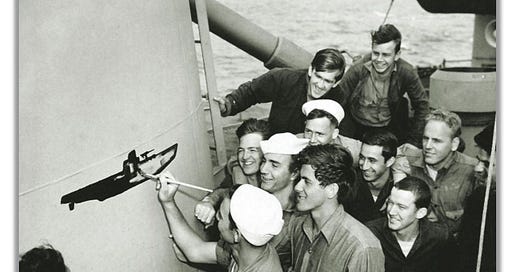TDIH: Last German U-Boat in American Waters
The demise of U-853 remains a mystery. Just how long was the sub still functional? Which attack was the one that finally took her down?
On this day in 1945, Americans destroy a German submarine near Point Judith, Rhode Island. That submarine, U-853, had torpedoed an American collier ship just one day earlier. SS Black Point would prove to be the last victim of a German U-boat in American waters.
Victory in Europe had been all but complete when Black Point was hit. Mere days earlier, Nazi Führer Adolf Hitler had taken his own life. Hitler’s death left Grand Admiral Karl Dönitz in command of German forces, and he’d ordered all U-boats to return home.
Did the 24-year-old captain of U-853 fail to get the message? Or did he simply ignore it? No one really knows. Either way, Oberleutnant Helmut Frömsdorf was patrolling an area near the American coast on May 6. He spotted Black Point, which was on its way home to Boston.
U-853 opened fire at about 5:40 p.m. Black Point was mortally wounded and began to sink.
Meanwhile, the crew of SS Kamen had seen the attack. An SOS went out as Kamen rushed to rescue survivors in the water, but Kamen wasn’t equipped to take down a submarine. Instead, the job would fall to the Coast Guard-manned frigate USS Moberly and two Navy destroyer escorts, USS Amick and USS Atherton. The three ships had been returning home from a convoy mission.
Those ships had a bit of a problem, though. They’d been in the process of deactivating ammunition.
“You couldn’t enter a Navy yard with live ammo on deck,” Atherton’s skipper Lt. Commander Lewis Iselin later remembered. “The idea was to deactivate everything except one depth charge, and then deactivate that just before you pulled in.”
Needless to say, Iselin laughed, they “had to rearm quite fast” when he received Kamen’s SOS.
Atherton’s sonar was the first to find U-853.
“We started looking for him. We thought he was near shore,” Iselin later said. “By a lucky chance I had a very, very good soundman. . . . You have to distinguish between the echo of the bottom and the echo of the sub . . . . It’s difficult to analyze whether it’s a hard spot in the sand or a wreck or a sub.”
Atherton deployed 13 magnetic depth charges, then some hedgehogs. It was impossible to tell what had been hit. “The water was so shallow—112 feet—you couldn’t tell whether it was going off on a floating object or the bottom,” Iselin explained.
Frömsdorf was still on the move. Worse, the water had become so churned up by explosions that sonar had become difficult to use.
Fortunately, more ships were showing up to help in the hunt.
U-853 was found again, closer to midnight. She was lying still on the ocean floor, presumably trying to stay as quiet as possible. Atherton launched another hedgehog attack, then her crew watched as bubbles of air and oil and pieces of broken wood rose to the surface.
Was U-853 hit? Or had she sent debris through torpedo tubes in an attempt to trick the Americans? Moberly’s sonar indicated that the sub was still moving at about four to five knots.
Needless to say, the American ships kept up their attacks.
Dawn broke revealing debris scattered across the ocean. Navy blimps had arrived to drop sonobuoys. Those buoys picked up sounds described as “a rhythmic hammering on a metal surface which was interrupted periodically.”
No one ever quite knew what it was. The American vessels dropped more explosives, and that seems to have been the end for U-853.
The demise of U-853 remains a mystery. Just how long was the sub still functional? Which attack was the one that finally took her down?
The only certainty is that an American diver from USS Penguin was able to confirm the sub’s destruction at about 12:30 on May 7.
That very same day, formal surrender documents were signed. The war in Europe was over.
Sources can always be found on my website, here.





How'd they get those spiny little hedgehogs in the launch tubes? 😉
It was a matter of war, finding and executing an enemy combatant who was in American waters, sinking maritime shipping. Well done, Coast Guard!